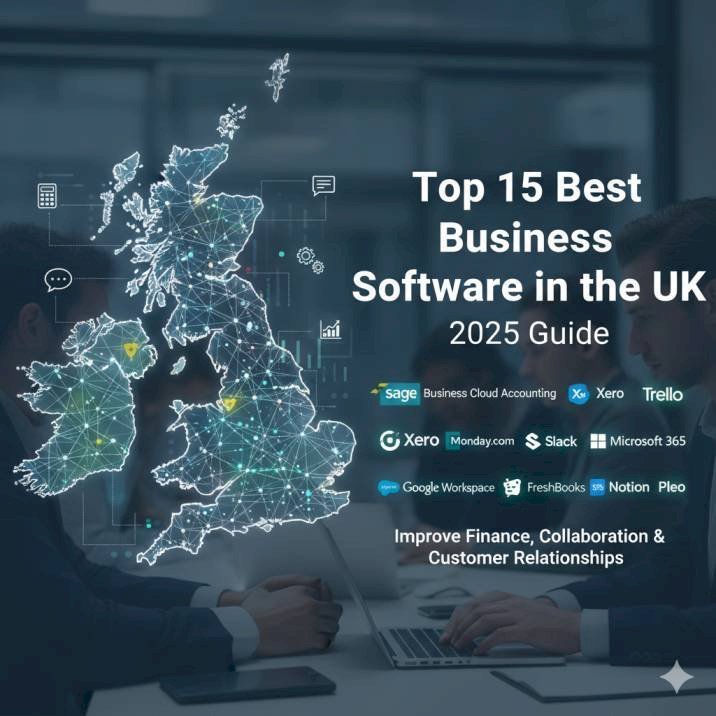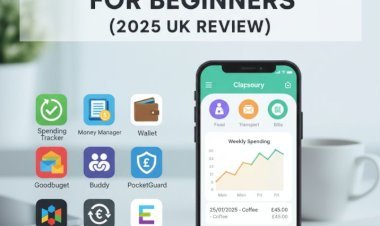Top 15 Best Business Software in the UK (2025 Guide)
Explore reliable business apps used across the UK for accounting, project management, communication and CRM. Suitable for startups, freelancers and SMEs in 2025.

The best business apps in the UK help organisations improve finance management, collaboration, workflow planning, data accuracy and customer relationships. Commonly used platforms include Sage, Xero, QuickBooks, Monday.com, Trello, Zoho CRM, Slack, Microsoft 365 and Google Workspace. These tools support reliable operations, secure cloud access and compliance with UK business and data protection requirements.
The right business software can help UK organisations work more efficiently by simplifying tasks, improving communication, supporting compliance and reducing manual workload. Whether operating a small business, a growing startup, a digital agency or a freelance service, trusted digital platforms make it easier to manage finance, projects, documents, customers and internal collaboration. Cloud-based tools also support remote working, real-time access, and secure storage, which are now essential in modern business operations. This guide provides an overview of reliable business software used across the United Kingdom in 2025, based on features, usability, integration support and suitability for different business sizes.
Business Software Comparison Table (Quick Overview)
| Software | Category | Best For | Pricing Model | Entry-Level Cost Range* | Free Plan / Trial | UK-Based? |
|---|---|---|---|---|---|---|
| Sage Business Cloud Accounting | Accounting | SMEs & service-based firms | Subscription | Typically from £10–£20+/month | Free trial available | Yes |
| QuickBooks UK | Accounting | Small businesses & sole traders | Subscription | Typically from £10–£25+/month | Free trial available | No (UK edition) |
| Xero | Accounting | Freelancers & remote teams | Subscription | Typically from £15–£30+/month | Free trial available | No |
| Monday.com | Work & Project Management | Teams & agencies | Per-user subscription | Typically from £7–£12+/user/month | Free trial available | No |
| Trello | Task Management | Individuals & small teams | Freemium | Free plan available | Yes (paid upgrades) | No |
| Zoho CRM | CRM & Sales Automation | SMEs & sales-driven businesses | Per-user subscription | Typically from £11–£20+/user/month | Free trial available | No |
| Slack | Team Communication | Remote & hybrid teams | Per-user subscription | Free plan available | Yes (paid upgrades) | No |
| Microsoft 365 | Productivity Suite | All business types | Per-user subscription | Typically from £4–£20+/user/month | Free trial available | Yes (UK operations) |
| Google Workspace | Cloud Collaboration | Remote & digital-first teams | Per-user subscription | Typically from £4–£15+/user/month | Free trial available | No |
| Salesforce | CRM & Automation | Scaling & enterprise organisations | Tiered subscription | Typically from £20+/user/month | Free trial available | No |
| Shopify | E-Commerce Platform | Retail & online sellers | Subscription | Typically from £19+/month | Free trial available | No |
| FreshBooks | Invoicing & Accounting | Freelancers & consultants | Subscription | Typically from £13+/month | Free trial available | No |
| ClickUp | Project + Work Hub | Startups & growing teams | Per-user subscription | Free plan available | Yes (paid upgrades) | No |
| Notion | Workspace & Documentation | Startups & creative teams | Freemium | Free plan available | Yes (paid upgrades) | No |
| Pleo | Expense Management | Teams with regular spending | Custom pricing | Varies by usage & seats | Free trial available | No |
Important Notes
-
*Prices are approximate ranges based on standard advertised entry-level plans and may vary by region, billing cycle, discounts, promotions, and add-ons.
-
Always verify pricing directly on the official website before publishing or advising users.
-
"UK-Based" refers to company origin or headquarters status, not UK product availability.
Growth of Digital Business Software in the UK

Image source: pinterest.com
Digital technology has become an essential part of business operations in the United Kingdom, helping organisations move away from manual processes and adopt systems that support accuracy, speed and teamwork. Many companies now use software for accounting, communication, sales tracking, document storage, customer management and project planning to achieve a smoother workflow and better decision-making. The choice of software often depends on business size, features required, integration needs, security standards and long-term goals.
In recent years, the use of cloud-based business software has increased across the UK due to its secure remote access, multi-device availability, data backup support and ability to connect distributed teams. Changes in working patterns, digital tax policies and cybersecurity awareness have also encouraged organisations to choose verified online platforms. With free trials and scalable subscription plans available, businesses of every size can now adopt tools that were previously common mainly in large organisations.
1. Sage Business Cloud Accounting
Sage Business Cloud Accounting is a UK-based online accounting platform designed for small and medium-sized organisations. It provides digital invoicing, bank reconciliation, cash-flow tracking, reporting and VAT submission compliant with HMRC digital filing requirements. The platform includes business performance dashboards and a mobile application for working remotely. Although it is straightforward to operate, certain advanced features are only available in higher subscription levels.
Most suitable for: SMEs and service-based businesses.
2. QuickBooks UK
QuickBooks UK is a recognised accounting platform designed for small organisations that require digital VAT handling, invoicing, payroll assistance, expense monitoring and bank account integration. Its dashboard presents financial information clearly, and the app supports receipt capture for expense reporting. While the software is feature-rich, beginners may need learning time and additional add-ons may increase cost.
Most suitable for: Startups, micro-businesses and SMEs.
3. Xero
Xero is a cloud-focused accounting solution known for its clear interface and strong remote-collaboration features. It offers live reporting, automated invoicing, bank feed syncing and optional payroll services. It is often chosen by businesses that prioritise digital access from multiple devices.
Most suitable for: Remote teams and digital-first businesses.
4. Monday.com
Monday.com is a work and project management platform that allows teams to create structured workflows, assign responsibilities, set deadlines and monitor progress. It supports automation and multiple layout options such as board view, calendar and timeline.
Most suitable for: Multi-department teams needing workflow coordination.
5. Trello
Trello is a simple Kanban-style work tracker suitable for task planning, campaign scheduling and general organisational activities. It is easy to understand and does not require technical experience.
Most suitable for: Freelancers and small teams.
6. Zoho CRM
Zoho CRM centralises sales records, contact information, email engagement and performance analytics. It provides workflow automation, lead pipeline monitoring and reporting, and integrates with other Zoho business tools.
Most suitable for: Small and medium-sized sales-driven organisations.
7. Slack
Slack is a digital communication system designed to reduce internal emails and support channel-based messaging. It includes file-sharing, message search features and call options, with integration support for external work tools.
Most suitable for: Remote or hybrid teams.
8. Microsoft 365
Microsoft 365 is a widely used productivity suite offering Word, Excel, Outlook, PowerPoint, Teams, OneDrive and SharePoint. It enables secure communication, file management and business collaboration.
Most suitable for: Organisations needing comprehensive office tools.
9. Google Workspace
Google Workspace provides cloud-based email hosting and productivity software including Docs, Sheets, Meet, Calendar and Drive. It supports real-time collaboration and easy file-sharing across devices.
Most suitable for: Businesses seeking a cloud-first work environment.
10. Salesforce
Salesforce is an enterprise CRM platform offering advanced automation, reporting, analytics and customer lifecycle management features. It is scalable but may require onboarding and training for new users.
Most suitable for: Medium and large organisations with structured sales operations.
11. Shopify
Shopify is a leading e-commerce platform that enables businesses to build online stores with integrated payment, inventory and shipping management. It supports both physical and digital product sales.
Most suitable for: Retail businesses and new online sellers.
12. FreshBooks
FreshBooks is an invoicing and accounting tool focused on simplicity rather than advanced accounting. It supports estimates, time tracking and expense management.
Most suitable for: Freelancers and independent service providers.
13. ClickUp
ClickUp is a central work management platform that combines task tracking, documentation, goal planning, chat and reporting in a single system. It can reduce the need for multiple separate tools.
Most suitable for: Growing teams seeking platform consolidation.
14. Notion
Notion is a modular digital workspace used for documentation, knowledge sharing, internal guidelines and basic project planning. It allows users to build structured information pages without coding.
Most suitable for: Teams needing organised internal documentation.
15. Pleo
Pleo is an expense management tool using prepaid company cards linked to digital receipt capture. It automates publishing records, approvals and categorisation to reduce paperwork.
Most suitable for: Teams with regular operational expenses.
Additional Guidance and Expanded Notes
Software adoption in the UK has increased because organisations seek efficiency, accuracy and secure handling of business data. Cloud-based systems allow employees to collaborate, access files remotely and maintain accurate data without depending on office-based hardware. For new companies, the recommended approach is to start with finance and communication platforms, then introduce project, CRM or specialist tools once the organisation expands. It is also useful to perform periodic software reviews to ensure each chosen tool continues to meet business requirements, especially when hiring, entering new markets, or launching new services.
Organisations should also assess integration capabilities before selecting a platform, ensuring it can connect with existing systems instead of creating isolated digital environments. Access control, security protocols and data management policies should be reviewed before onboarding employees. Free trials allow businesses to evaluate functionality without early financial commitment.
Key Considerations When Selecting Business Software

Image source: pinterest.com
-
Usability for non-technical users
-
Integration compatibility with existing tools
-
Pricing and future scalability
-
UK-aligned compliance and data protection
-
Access to documentation and support
Conclusion
Business software is now fundamental to modern operations across the United Kingdom. The most suitable platform varies depending on business goals, growth stage, team size and workflow structure. Accounting-focused companies may prefer Sage, QuickBooks or Xero, while collaboration-focused teams may select Monday.com, ClickUp, Slack or Microsoft 365. Reviewing needs, testing free trials and considering long-term scalability help ensure the most suitable selection.
Frequently Asked Questions (FAQs)
1. What are the best business apps used in the UK?
Some of the most commonly used business apps in the UK include Sage Business Cloud Accounting, Xero, QuickBooks UK, Monday.com, Trello, Zoho CRM, Slack, Microsoft 365, Google Workspace, ClickUp and Shopify. The best choice depends on business size, workflow needs and planned integrations.
2. Which business app is best for small businesses in the UK?
Small businesses often prefer QuickBooks UK, Xero, Trello, Zoho CRM and Microsoft 365 because they are cost-effective, easy to use, suitable for smaller teams and support digital business processes without requiring complex onboarding.
3. Which business app is suitable for freelancers in the UK?
Freelancers may find FreshBooks, Trello, Notion, ClickUp and Google Workspace useful because these tools support invoicing, project planning, document management and communication without requiring full enterprise features.
4. Are these business apps compliant with UK data and tax rules?
Many accounting apps such as Sage, QuickBooks UK and Xero are designed to support Making Tax Digital requirements, and leading collaboration apps offer GDPR-aligned data handling. Users should still review each platform’s documentation and settings before setup.
5. Do UK business apps offer free plans or trials?
Several business apps offer free tiers or trial periods. Examples include Trello, Slack, ClickUp, Notion, Zoho CRM (limited features) and Google Workspace trial access. Advanced features are available in paid subscriptions.
6. How do I choose the right business app for my company?
Consider your operational needs, learning curve, integration requirements, pricing model, security controls and scalability. Testing a free trial before subscription can help determine suitability.
7. Can business apps help with remote and hybrid working in the UK?
Yes. Most modern business apps are cloud-based and built for remote collaboration. Tools like Slack, Microsoft Teams, Google Workspace, ClickUp and Monday.com are widely used for hybrid work environments.
8. Are cloud-based business apps safe for UK companies?
Reputable cloud-based systems use encryption, access controls and secure servers. Businesses should still review privacy settings, user permission policies and data storage locations to ensure compliance with internal policies.

 AnniWeston
AnniWeston 











